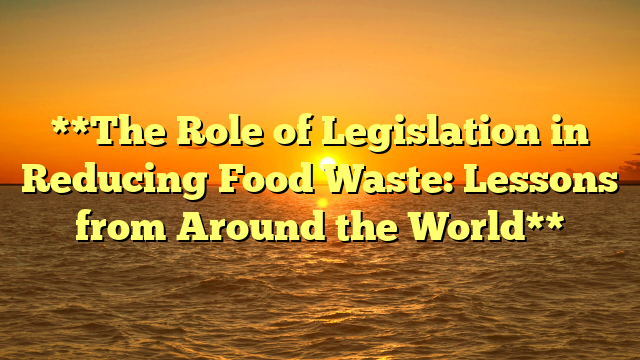
Food waste is a pressing global issue, with approximately 1.3 billion tons of food wasted annually, according to the United Nations. This not only represents a significant economic loss but also contributes to environmental degradation and exacerbates food insecurity. Governments worldwide have recognized the urgency of addressing this problem and have turned to legislation as a key tool to reduce food waste. By examining successful policies from different countries, we can identify effective strategies and lessons for creating impactful legislation.
**France: Leading the Way with Mandatory Food Donations**
France has emerged as a global leader in combating food waste through legislation. In 2016, the French government passed a groundbreaking law that prohibits supermarkets from throwing away unsold but edible food. Instead, supermarkets are required to donate this food to charities and food banks. The law also includes penalties for non-compliance, ensuring accountability. This policy has not only reduced food waste but also helped address hunger by providing millions of meals to those in need. France’s success demonstrates the power of mandatory regulations and the importance of partnerships between businesses and non-profits.
**South Korea: Innovative Waste Management Systems**
South Korea has taken a unique approach to food waste reduction by implementing a strict pay-as-you-throw system. Households and businesses are required to separate food waste from other trash and pay based on the amount they discard. The government provides biodegradable bags for food waste, and the collected waste is recycled into compost, animal feed, or biogas. This system has led to a significant reduction in food waste, with recycling rates exceeding 95%. South Korea’s experience highlights the effectiveness of economic incentives and the importance of infrastructure for waste management.
**Italy: Incentivizing Food Donations**
Italy has adopted a different strategy by focusing on incentivizing food donations rather than imposing penalties. In 2016, the Italian government passed a law that simplifies the process of donating surplus food by reducing bureaucratic hurdles. The law also offers tax breaks to businesses that donate food, making it financially attractive. Additionally, it encourages the recovery of unsold food from farms and promotes the use of “doggy bags” in restaurants to reduce leftovers. angsa4d shows that positive reinforcement and simplification of processes can drive meaningful change.
**United States: Protecting Food Donors**
In the United States, the Good Samaritan Food Donation Act has played a crucial role in reducing food waste. This federal law protects businesses and individuals from liability when donating food in good faith, encouraging more donations to food banks and charities. While the U.S. lacks a comprehensive national food waste policy, several states and cities have implemented their own initiatives, such as mandatory composting programs and food waste bans. The U.S. experience underscores the importance of legal protections for donors and the potential for local governments to lead the way.
**Challenges and Lessons Learned**
While these examples demonstrate the potential of legislation to reduce food waste, challenges remain. One common issue is the lack of enforcement mechanisms, which can render even well-designed policies ineffective. Additionally, policies must be tailored to the specific cultural, economic, and logistical contexts of each country. For instance, while pay-as-you-throw systems work well in South Korea, they may face resistance in countries with less developed waste management infrastructure.
Another key lesson is the importance of collaboration between governments, businesses, and non-profits. Successful policies often involve partnerships that leverage the strengths of each sector. For example, France’s mandatory donation law relies on the cooperation of supermarkets and charities, while South Korea’s recycling system depends on public participation and government investment in infrastructure. Legislation plays a vital role in reducing food waste, as demonstrated by the successes of countries like France, South Korea, Italy, and the United States. Effective policies often combine clear regulations, economic incentives, and partnerships with stakeholders. However, challenges such as enforcement and cultural adaptation must be addressed to ensure widespread impact. By learning from these global examples, governments can design and implement legislation that not only reduces food waste but also promotes sustainability and food security. As the world continues to grapple with the consequences of food waste, strong and innovative legislation will be essential to creating a more sustainable future.




